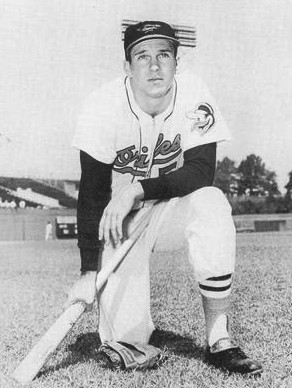Baseball great Brooks Robinson passed away on September 26th, aged 86. He was at the heart of the Baltimore Orioles teams that I loved in the 1970s, a fixture at third base, a 16-time Gold Glove winner. He remained around the team even after retirement, and became a favorite adopted son of the city of Baltimore. Brooks's national profile went way up in after his MVP performance in the 1970 World Series, with the fielding gems he crafted and which have lived on in highlight reels ever since. I think of him first as a sweet-natured down-to-earth guy. From memory I can easily cue up the sound of his voice, that high pitched Arkansas accent, from local commercials and post-game interviews. Brooks had a Walter Mitty quality, giving hope to the balding, slope-shouldered anti-phenoms of the world. He epitomized the saying that an athlete is one thing, a baseball player is something else.
I've been looking over his numbers, and at what Bill James wrote about him in the Historical Abstract. It's possible, in light of latter-day analytics, that we (Oriole fans and others of his contemporaries) overrated Brooks somewhat: that the dazzling defensive highlight reel outshone his offensive abilities, which were good but not dazzling. He was possibly the greatest fielding third baseman who ever played. But overall, Bill James has him at number 7 on the all-time 3B rankings, and he's probably fallen a notch or two since that list was published in 2001. There were years in the heart of his career where Brooks was an average hitter, or a little worse.
Brooks led the league twice in GIDP, which is evidence that he was a slow runner. But also, he led the league four times in Sacrifice Flies (and wow, there are a lot of ex-Orioles near the top of this list). He didn't strike out much, which speaks to good strike zone judgment and bat control. He didn't have brute batting power, but I'd say he had the timing and mechanics needed to ride the ball a long way. Given Brooks's obvious defensive skill set, gained through hard work and practice and study of the game, it makes sense to me to think of his offensive skill set this way. In his career, Brooks hit 268 home runs and 114 sacrifice flies. Robin Yount is the only player with fewer HR's and more SF's (251 and 123).
I had a memory that turns out to be apocryphal: Brooks had a sporting-goods business that got into trouble, at or near the end of his playing career. In my mind, Baltimore fans had spontaneously come forward and donated cash to help Brooks stave off bankruptcy. According to Wikipedia, this was an exaggeration (though there was public concern that Brooks would lose his house). Wikipedia also contains an anecdote that in 1976, when Earl Weaver told Brooks he was being benched in favor of young Doug DeCinces (a handsome, broad-shouldered phenom of the classic type), Brooks asked the Orioles to explore the possibility of trading him. The Chicago White Sox were interested, but would not extend Brooks's contract beyond that season. So Brooks vetoed the deal. Late in the 1977 season Brooks retired, having never worn a big-league uniform other than Baltimore's.
Photo: Jay Publishing via tradingcarddb.com, Public domain, via Wikimedia Commons
